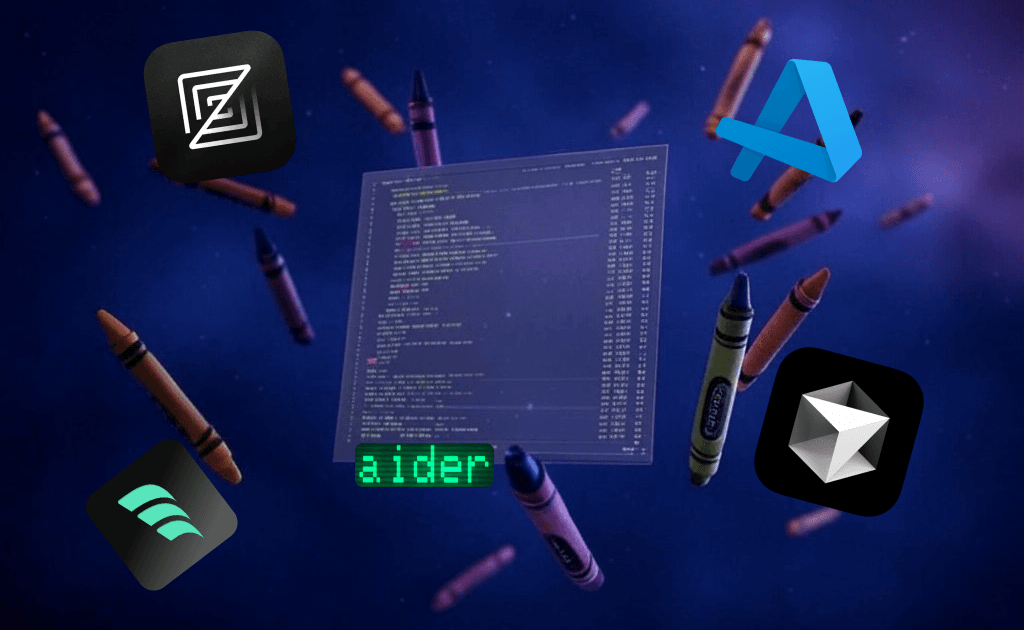90% of my code is now written by AI—half by Claude, some by OpenAI, and a bit by Ollama. It doesn’t really matter which AI is writing it, as long as it gets done. Once you're used to Cursor for coding and UI generators like Vercel's v0, there’s just no going back to manual workflows or pushing rectangles around in design tools.
As Paul Graham pointed out, many companies are heading in this direction too, with some replacing Figma with...Replit:
Loading tweet... View on X
What's more though, despite the focus on Replit above, I find the flexibility of today's AI workflows mean we're no longer tied to any single tool anymore. That's what I'm showing in this post - how AI tools are like pens in a pot that you can use interchangeably on your code:
Code is the paper, AI tools are pens
Unlike design tools where a project file is often dependent on the tool it's created with, with today's AI workflows, I find the project and its code has become more of the entry point over the tools that open them.
For example, I often find myself swapping from Cursor to Windsurf, then passing my code into VS Code and Cline, or Zed.dev and Aider. I show a bit of this in the following video where I'm learning aider:
By swapping around, you can get the benefits of different tools. Here's some more specific examples:
If Cursor becomes slow or you've run out of credits, open your project in Zed.dev
Zed is good for refactoring existing code and inline transformations, and could be faster and cheaper than waiting in the Cursor prompt queue.
Run Aider with Zed if you need multi-file editing (as a Cursor or Windsurf alternative)
Switch to VS Code if Microsoft are giving you free Copilot Credits

You could even have Cursor and Windsurf open at the same time, and they'll both update with your project's changes. Each tool complements the other, potentially leading to a more cost-effective and faster workflow.
It's not too dissimilar to how Aider lets you combine different LLMs - using one as an 'architect', and the other as the 'editor':
AI can get expensive
As well as features, another big reason for switching editors is their price.
For instance, Aider is open source, so essentially free to use. However, you have to pay for credits from Antrhopic and OpenAI, which can cost a lot – much more than the $20/m for Cursor or Windsurf!
Careful of the context
Aider can end up expensive depending on the AI model you're using, and especially if you leave large files in the editor context. The tokens get counted for each request, so you have to be careful to use Aider cost-effectively. While handy, its context management is less automated.
Here's an example bill for a few hours use:

On the other hand, premium IDEs like Cursor are much more user friendly. The chat maintains history and context, so it gives better answers with less effort from the user. For $20 a month, it ends up really cheap in comparison - but the wait times can be frustrating once you've used your 500 fast requests.
Open Source LLMs to the rescue: DeepSeek
Open Source AI tools such as Aider really are alternatives to premium tools, falling short mainly on the LLM costs.
Venture-backed tools like Cursor and Windsurf have the resources to offer unlimited AI usage (be it throttled and slow) at a flat rate of $20. However, in the near future, it looks like Open Source LLMs will solve the API cost issues I experienced with Aider:
Loading tweet... View on X
For example, DeepSeek-R1 has recently amazed the world, exceeding OpenAIs latest o1 model in some benchmarks, at 3% of the price:
Loading tweet... View on X
In the future, I'd like to try and run an open source LLM with Aider. Stay tuned for the next article and video! Follow the channel on YouTube:

Editors to try
Here's a few editors that were mentioned in this article, plus one I didn't get round to trying:
Zed primarily offers its AI features free during its initial launch period.

I've not tried Continue yet, but it's open source, and you plug in your own LLM (and probably pay for that).

I'm primarily using Cursor - sometimes even the slow requests are fast enough depending on the queues. For $20, it's been the most cost-effective for me:

I only tried the free trial, but I found the UI the nicest for a multi-file editor. I don't know about continued usage limits and the pricing beyond the free trial, but definitely worth a go:




 Buy me a coffee
Buy me a coffee



